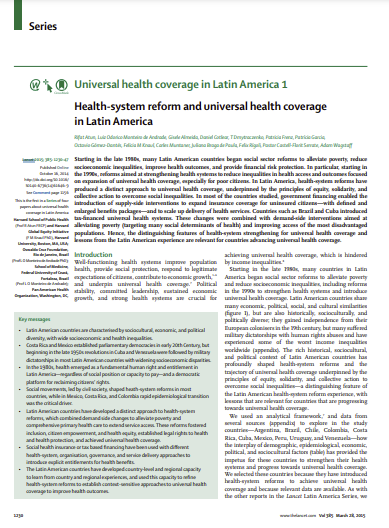Health-system reform and universal health coverage in Latin America
Licencia: Creative Commons (by-nc-nd)
Autor(es): Atun, Rifat; [et al.]
Starting in the late 1980s, many Latin American countries began social sector reforms to alleviate poverty, reduce socioeconomic inequalities, improve health outcomes, and provide fi nancial risk protection. In particular, starting in the 1990s, reforms aimed at strengthening health systems to reduce inequalities in health access and outcomes focused on expansion of universal health coverage, especially for poor citizens. In Latin America, health-system reforms have produced a distinct approach to universal health coverage, underpinned by the principles of equity, solidarity, and collective action to overcome social inequalities. In most of the countries studied, government fi nancing enabled the introduction of supply-side interventions to expand insurance coverage for uninsured citizens—with defi ned and enlarged benefi ts packages—and to scale up delivery of health services. Countries such as Brazil and Cuba introduced tax-fi nanced universal health systems. These changes were combined with demand-side interventions aimed at alleviating poverty (targeting many social determinants of health) and improving access of the most disadvantaged populations. Hence, the distinguishing features of health-system strengthening for universal health coverage and lessons from the Latin American experience are relevant for countries advancing universal health coverage.
[2015]
Compartir:
Una vez que el usuario haya visto al menos un documento, este fragmento será visible.


